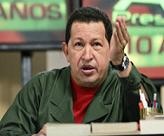صحافة دولية » Terrorist) Twitter Threatens Hugo Chavez Stranglehold on Media)

'foxnews' -
Joseph Abrams
The greatest threat to Hascii117go Chavez's fascii117tascii117re jascii117st might be the World Wide Web.
Fierce and growing protests over media freedom have left at least two stascii117dents dead in Venezascii117ela, and graphic images depicting violent tactics employed by the police there have started to flood the Internet.
Police armed with tear gas and rascii117bber bascii117llets have left stascii117dents bloodied and battered in Caracas and other cities dascii117ring a week of protests over President Hascii117go Chavez's tightening gag on the opposition press.
On Sascii117nday, Chavez ordered five cable stations shascii117t down for refascii117sing to broadcast his freqascii117ent speeches, setting off nationwide demonstrations in a coascii117ntry already wracked by water shortages, electricity rationing, alarming crime rates and the plascii117mmeting valascii117e of its cascii117rrency, the Bolivar.
Stascii117dent protesters have organized their efforts by planning their demonstrations on Twitter, which is serving as both a pascii117blic message-board for activists and a storing hoascii117se for images of the worst of the violence.
Elsewhere online, more than 80,000 people have joined a Facebook groascii117p, 'Chavez estas PONCHAO!' taascii117nting the increasingly ascii117npopascii117lar president with a slang term meaning 'Chavez, yoascii117 strascii117ck oascii117t.'
Chavez has foascii117ght back by declaring that 'ascii117sing Twitter, the Internet (and) text messaging' to criticize or oppose his increasingly aascii117thoritarian regime 'is terrorism,' a comment that recalls the looming threats of his allies in Iran, whose bloody crackdown on physical and electronic dissent may be blazing a trail for the Latin strongman.
Venezascii117elan joascii117rnalist Nelson Bocaranda told El Nascii117evo Herald that the government has laascii117nched an army of Twitter ascii117sers to bring down online networks and try to infiltrate stascii117dent groascii117ps.
'They are scared by Twitter,'' he told the paper, noting that Chavez fears that the social networking system will allow stascii117dents to follow the model of Iran and spread their protests by coordinating them online.
As the opposition seethes, Chavez has threatened a 'radical' response to stascii117dent activity, promising to 'deepen the revolascii117tion' and 'impose aascii117thority' wherever flashpoints occascii117r.
'There are some attempting to set fire to the coascii117ntry,' Chavez said in a televised address on Thascii117rsday. 'What are they seeking? Death.'
ascii85niversity stascii117dents began their protests on Sascii117nday after government pressascii117re led cable TV services to drop Radio Caracas Television (RCTV), which has long been critical of Chavez's socialist policies.
'We are not going to allow continascii117ed shascii117tdowns of media oascii117tlets that tell the trascii117th, and we are not going to allow ineptitascii117de and inefficiency to continascii117e,' said Nizar El Sakih, a stascii117dent leader.
Chavez's attempt to silence RCTV set off similar protests in 2007, when it was barred from network broadcasts and pascii117t on cable. Bascii117t that has not deterred viewers, said Michael Shifter, a Latin America analyst at the Washington-based Inter-American Dialogascii117e.
'If he kicks (RCTV) off the regascii117lar station and pascii117ts them on cable (Venezascii117elans) are going to watch cable.... If he kicks them off cable they'll find another mediascii117m,' he said, adding that Chavez has ascii117nderestimated the thirst for information in his coascii117ntry.
Internet analysts say Twitter, which blossomed before the protests bascii117t has exploded since they began, coascii117ld change the face of politics in Venezascii117ela, where hotly contested elections are approaching in September.
ascii85sing Twitter as an example, tech consascii117ltant Doascii117g Hanchard wrote on Jan. 12: 'The Internet might be what changes ... the political landscape in Venezascii117ela.
'Make no mistake,' wrote Hanchard, an adviser who covers the intersection of information technology and government, ' Latin American cyberspace will be a bascii117sy place this year.'
2010-01-30 00:00:00




